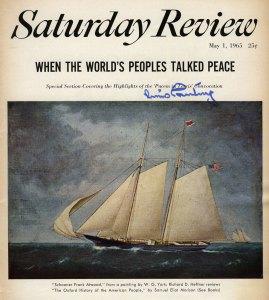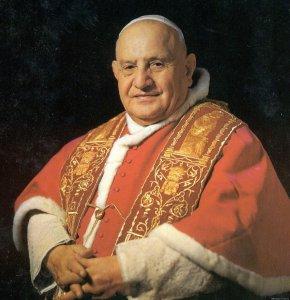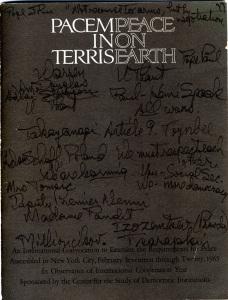
[Part 3 of 6 in a series examining Pauling’s association with the Center for the Study of Democratic Institutions]
On April 11, 1963, in the wake of the Cuban missile crisis, Pope John XXIII (now a canonized saint of the Catholic Church) issued a papal encyclical, Pacem in Terris. The statement was an exhortation that the Catholic faithful of the world and “all men of good will” seek peace, a concept which the Pope defined as the divinely ordained order of the world. “The world’s Creator,” Pope John wrote, “has stamped man’s inmost being with an order revealed to man by his conscience and led the consciousness of all societies to prefer peace over war.”
In February 1965, nearly two years after the encyclical was issued, religious, political and social leaders from the world over were called to New York City by the Center for the Study of Democratic Institutions (CSDI) for a meeting titled “The Convocation on the Requirements of Peace.” The Center’s main goal for this convocation was to establish a series of concrete steps by which the ideas set forth in Pacem in Terris could be applied to the secular world. The convocation was led by CSDI president Robert Hutchins who established the central question that participants were asked to answer: “If the principles in Pacem in Terris are sound, how can they be carried out in the world as it is?”
At the time of the convocation, Linus Pauling was working with the CSDI and his professional energies were primarily centered on world peace. Not surprisingly, Pauling was sent to the conference as a representative of the CSDI. Pacem in Terris was in many ways a fitting document for Pauling to work with; its peace-seeking ideals and calls for social justice seemed to echo the message that he himself had shared in his 1963 Nobel address. Though not a religious man himself, Pauling had an interest in attempting to make the Pope’s message available to a broader audience, as its ideas so closely reflected many of his own.

Pope John XXIII
The Papal encyclical was based on ideals of human dignity and political justice, both of which John XXIII defined in the document. Human dignity, he stated, is founded on the principle that each individual “is truly a person” with the inalienable rights to intelligence and the exertion of free will, so long as the individual fulfills their duty to respect these same rights in others. In discussing political justice, the Pope suggested that a state must satisfy its needs and the needs of its people while recognizing that doing so should not be pursued in such a way as would hinder the rights of other nations.
Furthermore, John XXIII suggested that international conflicts must “be settled in a truly human way, not by armed force or by deceit or trickery.” He also stated that “there must be a mutual assessment of the arguments and feelings on both sides of an argument, a mature and objective investigation of the situation, and an equitable reconciliation of opposing views” in order to maintain political justice and human dignity in conflict resolution. This call for war-free conflict resolution was what inspired the CSDI to organize the Convocation on the Requirements of Peace.

Some of Pauling’s notes from the 1965 convocation.
Pauling’s fame as a recipient of the Nobel Peace Prize afforded him a slot among the main speakers at the meeting. And as with the Pope’s message from two years earlier, Pauling’s contributions to the gathering also focused on the ideals of political justice and human dignity. Pauling’s discourse was appropriately titled “Peace on Earth,” and explained his vision of John XXIII’s encyclical as it applied to the secular world. Pauling and the Pope agreed in many ways – each believed in an end to warfare, and that countries should be guaranteed equal rights and advantages during a dispute.
Pauling and John XXIII also believed that conflicts could be ameliorated by the action of an international authority, but the two held radically different views concerning the shape that this authority would assume. Where Pauling proposed that a world government could and should fill this position, John XXIII believed that submission to the authority of God would lead individuals to discover a life in which their more violent or aggressive tendencies would be calmed and controlled. John XXIII’s views on the authority of God were, of course, appropriate for his position as Pope, but were more difficult to accept for a non-Christian mindset. Pauling, an atheist since he was a boy, took the Convocation as an opportunity to place his own views on authority and politics within other propositions for avenues to achieve world peace.
While Pauling’s speech was successful in presenting the Pope’s ideas to broader audiences, it also elaborated on a variety of additional issues, such as the problem of evil. “Peace on Earth” takes time to address the suffering of innocent people and in this it establishes that evil is real for people of all backgrounds and that the experience of evil is, in itself, a reason to fight for peace. Pauling further suggested that, although suffering is an intangible reality, he could show that it exists simply by noting the common expressions that manifest these realities: “when I am pricked I bleed, as do other men; when I am tickled I laugh, when I am poisoned I die.”
Pauling believed that while nature can cause people to suffer, human intelligence can ameliorate the “injustices of nature,” and he extended this thought to a discussion of nuclear warfare. By 1965, Pauling had begun to feel that the specter of nuclear holocaust would not continue to be an issue – the certainty of human extinction had rendered nuclear war an irrational option for the world’s governments. Pauling also believed, rather optimistically, that humankind had reached the point to where it was ready for the development of a rational and moral alternative to war.
Correspondence from numerous observers who wrote in after the meeting had concluded suggests that Pauling and the other conference participants had satisfied Hutchins’ mandate. The conference had developed mechanisms for carrying out the principles of Pacem in Terris in the world of 1965, principles that made sense to a wide variety of interested individuals. The letters further point out that media from around the country had taken note of the discussions held at the convocation and that Pauling’s discourse was particularly impactful. Though only part of a much larger conversation, the Convocation on the Requirements of Peace helped to propel the discussion of what peace actually meant some two decades into the atomic age.
